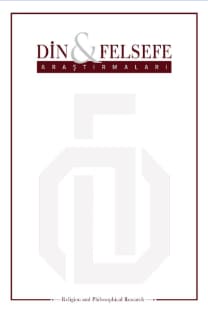Davı̇d Papı̇neau’nun Naturalı̇zm-Fı̇zı̇kalı̇zm Argümanları Üzerı̇ne Bı̇r Deneme
Günümüz felsefe ekollerinde önemli bir yer tutmaya başlayan felsefi naturalizm (philosophical naturalism) felsefe tarihinde Platon’dan beri süre gelen temel epistemoloji sorularının bir dönüşüme uğramasına neden olmakta ve dış dünyayı ‘nasıl temsil ettiğimize’ yönelik felsefi temellendirmeler yerini, ‘beyin süreçlerinin nasıl işlediği’ sorusuna bırakmaya başlamaktadır. Bu husus sadece felsefenin bertaraf edilmesine yönelik bir problem olarak tebarüz etmemekte, bilakis ‘insan nedir?’ sorusunun temelini teşkil eden bir sorun olarak karşımıza çıkmaktadır. Zira gerek fizikalizm, gerek felsefi naturalizm ve gerek yapay zekâ tartışmalarına mahal veren ‘zihnin, beyin süreçlerine irca edilmesi’ meselesi günümüz felsefesinin ehemmiyetli bir mevzuunu vücuda getirmektedir. Bu bağlamda, bu çalışmada David Papineau’nun Philosophical Naturalism adlı eserinin fizikalizm mevzuuna ilişkin ortaya koymuş olduğu naturalizm düşüncelerinden hareketle ‘zihin hâllerinin beyin hâlleri olduğu’ iddiası değerlendirilmeye tâbi tutulacaktır. Fakat bu değerlendirmenin doğru bir şekilde ilerleyebilmesi için Papineau’nun karşı çıktığı ‘bağlı olma’ (supervenience) tezi ile savunduğu ‘gerçekleşme’ (realization) tezi arasındaki fark vazıh bir hâle getirilmeye çalışılacaktır. Lakin Papineau tarafından ‘bağlı olma’ (supervenience) tezinin iyi bir fizikalist tutum olmadığı ve bu sebeple de ‘fiziğin tamlığı’ (completness of physic) ilkesine yeterince dayanmadığı, buna mukabil ‘gerçekleşme’ (realization) tezinin ve nedensel argümanın (causal argument) ‘fiziğin tamlığı’ (completness of physic) ilkesini en iyi temsil eden bir açıklama biçimi olduğu’ iddiası izah edilmeye çalışılacaktır. Bilahare Papineau’nun fiziğin tamlığı ilkesine yönelik olarak inşa ettiği argümanlarının tutarlılığı ve böylelikle, zihnî olanı fiziki olana irca etme çabasının başarılı olup - olmadığı tetkik edilmeye çalışılacaktır.
Anahtar Kelimeler:
David Papineau, Naturalizm/Tabiatçılık, Bilinç, Zihin, Fiziğin Tamlığı, Nedensel Argüman
An Essay on Arguments of Naturalism- Physicalism of David Papineau
Philosophical naturalism, which is starting to hold an important place in the today’s schools of philosophy cause a transformation of the fundamental questions of epistemology that have been around since Plato in the history of philosophy; and the philosophical justification of how we represent the outside world are replaced by the question of how brain processes work. This isue is not just a problem about annihilation of philosophy. On the contrary, it arises as a problem that forms the basis of the question of what is human. The issue of reducing the mind to brain processes, which allows discussions of both physicalism, philosophical naturalism and artificial intelligence give rise to an important subject of today's philosophy. In this context, in this study, we will discuss the topic of physicalism in David Papineau's work Philosophical Naturalism. We will explain difference between that/which Papineau refused ‘supervenience' thesis with advocated ‘realization' thesis for our assessment of this to be more understandable. İndeed acording to Papineau, supervenience thesis is not based on the principle of the completeness of physics; and therefore it is not the fizikalist thesis. However, the realization thesis and the causal argument is based on the principle of the completeness of physics; according to this Papineau, it is a best fizikalist argument. In this context, my purpose in this article is to examine the consistency of all these claims of Papineau and whether reduction efforts to the physics of the mind are successful.
Keywords:
David Papineau, Naturalism, Consciousness, Mind, Completness of Physics, Causal Arguments,
___
- Ansgar Beckermann, “Property Physicalism, Reduction and Realization”, M. Carrier and P. Machamer (Ed.). Mindscapes, Philosophy, Science, and the Mind. Konstanz: Universitätsverlag/ Pittsburgh: Pittsburgh University Press, 1997. https://www.uni-bielefeld.de/philosophie/personen/beckermann/prpph_ww.pdf.
- Berent Enç, “Philosophical Naturalism by David Papineau”, The British Journal for the Philosophy of Science, Vol.45, No.4, December, 1994.
- Brian McLaughlin and Karen Bennet, “Supervenience”, Standford Encyclopedia of Philosophy, https://plato.stanford.edu/entries/supervenience/#SupeOntoInno, (Erişim Tarihi: 27.04.2018).
- Daniel Bonevac, Supervenience and Ontology, American Philosophical Quarterly, Vol.25, No.1, January, 1988, ss.37-47, s. 38. http://www.jstor.org/stable/20014221.
- Daniel Stoljar, “Physicalism”, Standford Encyclopedia of Philosophy, https://plato.stanford.edu/entries/physicalism/#ModStaPro, (Erişim Tarihi: 23.04.2018).
- David Lewis, On the Plurality of Worlds, Oxford: Blackwell, 1986
- David Papineau, Philosophical Naturalism, London: Blackwell Publishers, 1993
- David Papineau, “The Rise of Physicalism”, Carl Gıllett ve Barry Loewer (Ed.). Physicalism and its Discontents içinde (3-37), Cambridge: Cambridge University Press, 2001
- David Chalmers, The Conscious Mind, New York: Oxford University Press, 1996
- David Papineau, “Précis of Philosophical Naturalism”, Philosophy and Phenomenological Research, Vol.56, No.3, September 1996
- David K. Lewis, “New Work for a Theory of Universals,” Australasian Journal of Philosophy, 61, 1983, ss.343–77, s. 364. http://www.andrewmbailey.com/dkl/New_Work.pdf
- Frank Jackson, From Metaphysics to Ethics, Oxford: Oxford University Press, 1998
- John Bickle, “Multiple Realizability”, Standford Encyclopedia of Philosophy, https://plato.stanford.edu/entries/multiple-realizability/, (Erişim Tarihi: 24.04.2018).
- Michael Lacewing, “Mind–Brain Type Identity Theory”, Amazon AWS Routledge Taylor and Fransic Group, s. 1. http://s3-euw1-ap-pe-ws4-cws-documents.ri-prod.s3.amazonaws.com/9781138793934/A22014/materialism/Type%20identity%20theory.pdf, (Erişim Tarihi: 26.05.2018).
- Steven Schneider, “Identity Theory”, Internet Encyclopedia of Philosophy, https://www.iep.utm.edu/identity/#H3 (Erişim Tarihi: 27.04.2018).
- Standford Encyclopedia of Philosophy, “Physicalism” https://plato.stanford.edu/entries/physicalism/#ModStaPro, (Erişim Tarihi: 23.04.2018)
- Michael Bergmann, “Internalısm, Externalısm and the No-Defeater Condition”, Synthese 110, 1997, ss.399–417, s. 401-402. http://web.ics.purdue.edu/~bergmann/wp-content/uploads/2012/12/synthese-97.pdf.
- Linda Wetzel, “Type/Token Distinction”, Edward Craig (Ed.). Routledge Encyclopedia of Philosophy, Vol.9, 1998
- Linda Wetzel, “Types and Tokens”, Standford Encyclopedia of Philosophy, https://plato.stanford.edu/entries/types-tokens/
- Tomis Kapitan, “Philosophical Naturalism”, Mind, New Series, Vol.104, No.414, April 1995
- Thomas Nagel, “Physicalism” The Philosophical Review, 74(3), 1965, ss. 339–356,
- Peter Alan Morton, A Historical Introduction to the Philosophy of Mind: Readings with Commentary, Canada: Broadview Press, 2003.
- Yayın Aralığı: Yılda 2 Sayı
- Başlangıç: 2018
- Yayıncı: Din Felsefesi Derneği
Sayıdaki Diğer Makaleler
Umudun Epı̇stemolojı̇sı̇-Tatar Çölü
Wael B. Hallaq, İmkânsız Devlet: Modern Çağda Bir İslam Devleti Niçin Mümkün Değildir?
Davı̇d Papı̇neau’nun Naturalı̇zm-Fı̇zı̇kalı̇zm Argümanları Üzerı̇ne Bı̇r Deneme
Metodolojik Natüralizm, Ontolojik Natüralizm ve Sosyolojinin Sınırları
Tanrı Savunusu: Din Aslında Nedir?
İMKÂNSIZ DEVLET: MODERN ÇAĞDA BİR İSLAM DEVLETİ NİÇİN MÜMKÜN DEĞİLDİR?
